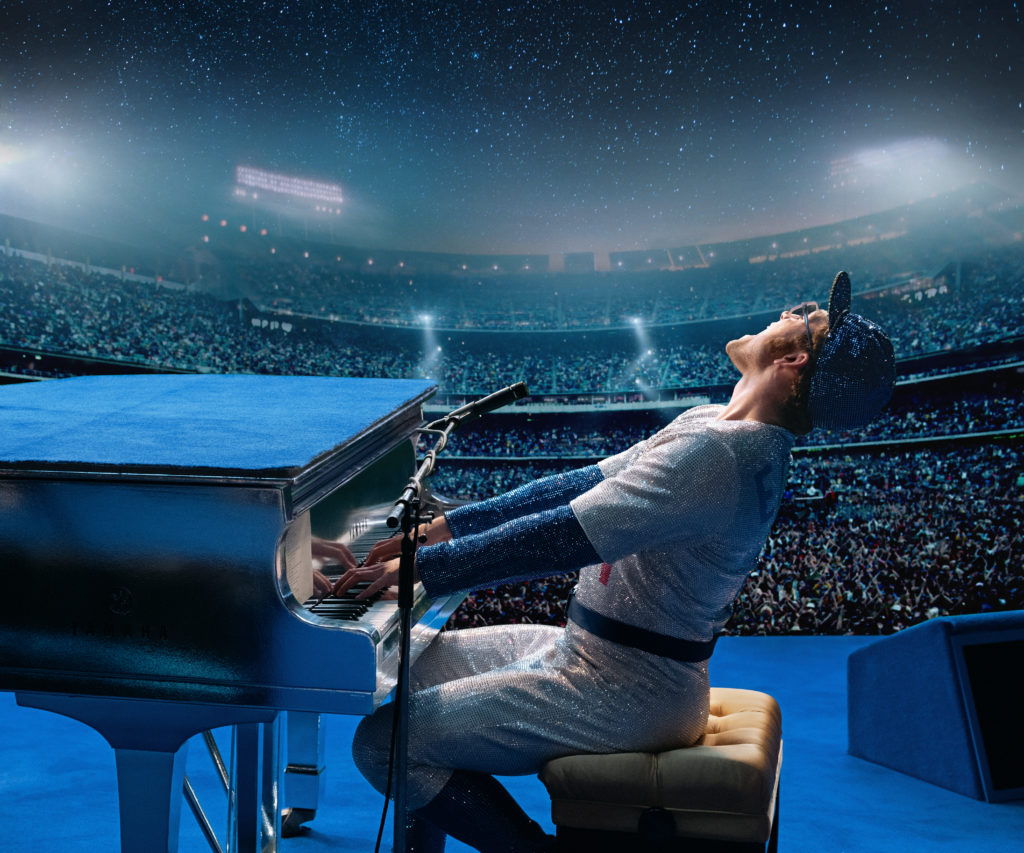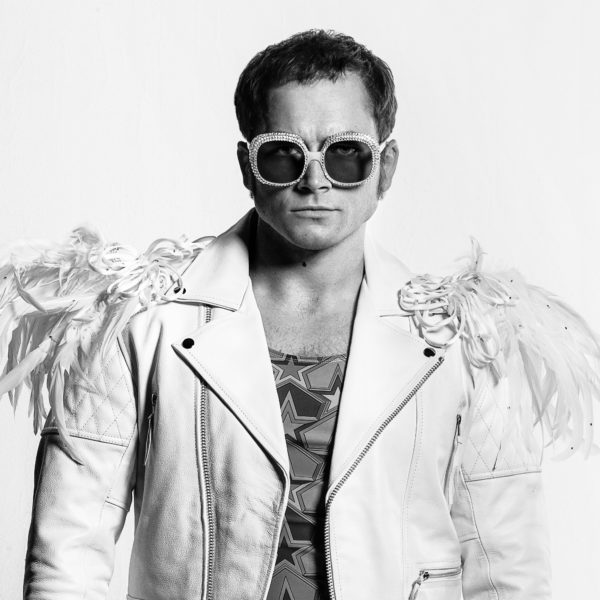Dexter Fletcher made his film debut in 1976 at age nine in Alan Parker’s ’30s gangster musical Bugsy Malone, to this day one of the most offbeat examples of the musical genre because of its all-child cast. Many movie landmarks later (David Lynch’s The Elephant Man, Derek Jarman’s Caravaggio, Guy Ritchie’s Lock, Stock and Two Smoking Barrels), Fletcher embarked on a directing career with the 2011 drama Wild Bill, and scored a minor hit with the real-life saga of an improbable Olympic ski-jumper, 2015’s Eddie the Eagle.
Now, Fletcher has come full circle from his musical apprenticeship, becoming the go-to director for two biopics of massive pop stars. Though he was uncredited, it’s widely known that Fletcher came in and finished the shoot of multi-Oscar winner and $900 million global smash Bohemian Rhapsody when original director Bryan Singer, the subject of sex-abuse accusations, was fired over his alleged erratic behavior and absences from the set of the Queen/Freddie Mercury biopic. Currently, Fletcher is preparing for the May 31 release of Paramount’s Rocketman, his musical fantasia about one of the most successful rock stars of all time, Elton John.
Interviewed in Las Vegas at CinemaCon, the energetic, disarming Fletcher deems this musical one-two combo “an accident.”
“It’s a curious story, isn’t it? Because I was attached to Bohemian Rhapsody when it was at Sony back in 2016, maybe ’15. And my vision for the film there didn’t really tally up with what they wanted to create—I wanted to do something a bit more challenging, so that fell apart for various different reasons. And then I got involved in Rocketman. When Matt Vaughn, the producer, and Paramount said to me that they wanted to create an R-rated musical, I knew I’d found a home, because that was really what I wanted to do with Bohemian Rhapsody. That’s what I personally wanted to do. I felt that it could be an R-rated movie, but that was never the desire with Bohemian Rhapsody—they were always very clear about what they wanted in terms of the rating. So when the opportunity came to do an R-rated musical about Elton John, I jumped at the chance, because all of that fervor and ambition for Bohemian Rhapsody that had not been realized kind of found its outlet. And then, of course, they had some issues with Bohemian Rhapsody. I’d worked with Fox on Eddie the Eagle, and [Eagle producer] Matt Vaughn, who works on Kingsman with Fox, said, ‘Dexter would be good for this because he knows the material, he knows Queen.’ I was already in pre-production with Rocketman … it’s just one of those extraordinary things: Fate came together and sort of put me in the right place at the right time.”
Unlike the more traditionally linear Bohemian Rhapsody, Rocketman is a full-blown musical, with fantasy sequences depicting the journey to stardom of Northwest London native Reginald Dwight, his adoption of his flamboyant stage persona, his coming out, and his battles with alcoholism and cocaine addiction. “What I’ve learned about doing biopics is that artistic license has to be involved,” Fletcher insists. “You can’t tell a story without it. And this created what I understood to be a really interesting dynamic. A bit like All That Jazz—you have someone retelling their own story and looking back on their own life. And it allows for fantasy that you can absolutely buy into, because our Elton comes into rehab at the beginning and he sits down and says, ‘I have a problem and I need to fix it.’ And memory is a fallible thing. It’s a beautiful, wonderful thing, because memory is a storytelling device. When you tell what you remember of what it was like to be a six-year-old kid growing up, it’s a story now. That’s what’s really exciting about it for me as a filmmaker, as a storyteller, is that we have a character who is kind of unreliable and addled by memories that are overlapping or tinged by substance abuse. It’s not in the third person. It’s not like Bohemian Rhapsody, [which] is in the third person and we look at it from the outside. We’re inside the story with Elton; we’re inside his recollection of what happened. With cracks and breaks and the way he misremembers things.”

With John as an executive producer and his husband, David Furnish, as a producer, Fletcher and screenwriter Lee Hall (Billy Elliot, Victoria & Abdul) had their blessing to delve into the dark chapters of the pop superstar’s life. “It’s not something he’s ever really shied away from or hidden. And I think that if we tried to tell the story and ignore that or hide it, people would have felt like it was a self-serving fluff piece or something. But it’s not. Elton was like: Tell it how it was, give the idea of what he went through. For me, the film is a story of a survivor, someone who has his problems and fights his way out to survive. And that’s something that we can all relate to. That’s something we all have to experience one way or another. That’s what humanizes it.”
Rocketman reunites Fletcher with his Eddie the Eagle star Taron Egerton, best known as the lead in the Kingsman spy action comedies, who does all his own singing in the film. “He loves playing characters whose name begins with an E and who wear glasses,” Fletcher jokes. “But the thing about Taron is he’s an actor with incredible, incredible range. There is that strange similarity, but it’s just coincidence.
“What’s phenomenal about Taron is that he not only has this breadth and range and this incredible vulnerability that he seems to be able to bring to whatever he does, but there’s a level of commitment he brings as well, and attention to detail. If you look at acting as a craft, in just the two films I’ve worked with him on, I can see him working and developing that every day. Every day he turned up … of course he turned up, they sent a car for him, but what I mean is that he brought his talent and his integrity and his desire to be better than the day before. In Rocketman you’ll see there’s no two days that were the same. He’s in every scene, and no two days were the same. There’s no two days where we could go: Well, it’s kind of like the other scene. There are lots of just single takes of Taron, not just because I love him, because I do, but because of the performance and the twists and turns and gear changes that he makes within one take. It’s like a theater piece, you know? I could cut away and look at someone else, but I don’t—there’s something so amazing going on here that he can just take himself to all these different places. It’s mercurial: How the fuck do you do that? I mean, I know about acting, but I still don’t know quite how he fits so many moments into one take. It’s amazing. And I don’t think he knows. So I just encourage that, turn the camera on, and then I’ll leave the room and let him do it.”
Rocketman found a little notoriety on social media over rumors that the studio wanted to cut a sex scene between Egerton and Richard Madden, who plays John’s manager and lover, John Reid. Fletcher is happy to address the controversy. “It’s more of a speculation than anything else. It’s interesting to me. It’s kind of obvious that maybe there’s someone who went: ‘Wow, there’s bound to be contention about that.’ It was always in the script, and Paramount green-lit an R-rated musical and that’s what I’ve made. That’s what we’ve made. There’s speculation about that, but it’s my job as the director to handle it in a responsible way. Because, you know, love scenes at the best of times are tricky things. You’ve got to find a beautiful way and a new way of telling that part of the story. And sure, we have a story that’s a love story between two men, and that’s even more kind of thorny in its way. But I’ve no desire and nor does the studio or the producers or David to create something that’s just going to be uncomfortable to watch, irrespective of what agenda is involved. You can watch a love scene between a man and a woman and go: Where’s the line here? There are certain things I could just go and find online if I want to see that. But, in answer to your question, no, there isn’t an issue with it. It’s down to me, it’s my call, and the studio backs me. They have issues about maybe some of the language occasionally: Do I need them to swear here? Because I give the actors very free rein. But again, that’s all part and parcel of creating a movie that’s going to be a mainstream film, for all intents and purposes. I think people are going to be amazed. I think some people will be shocked, and some people will be: ‘Wow! Isn’t that wonderful? There’s this kind of mainstream approach to who Elton is.’ I’m very proud of the love scene in the film. It’s very 2020, it’s very much of a moment, and hopefully people from every background and walk of life will appreciate it for what it is of this moment in this character’s journey. It’s not gratuitous, and hopefully people can see the beauty in it—I think it’s beautiful. As a straight man, I watch it and go: That looks great!”

Asked how he feels about the massive success of Bohemian Rhapsody and his lack of a directing credit, Fletcher responds, “Well, I got my producer credit, which was very nice, Rami [Malek, the Oscar-winning star] gave me a very nice acknowledgement at the BAFTAs as well. I didn’t go into it for that reason. I spoke with [Fox Film vice chair] Emma Watts and said: You know, I don’t need a credit. If you want me to come and be a part of it and help you, I was proud to do that. I’m thrilled for Rami and for Queen and Fox and [producer] Graham King and everyone who worked so hard on that film to get it to where it is. You know, Graham King had been working on that film for six to 10 years.
“I’m immensely proud. I’ll come on a flight to Vegas and I hear people say: ‘What did you watch on the plane?’ ‘Bohemian Rhapsody.’ ‘Oh yeah, I heard you singing along.’ And that’s great, that’s really good. And of course, I would love that for Elton. I would love that for Rocketman, because it’s been mine from the outset, I’ve brought it on its full journey. But there’s something that happened with Bohemian, because critically it wasn’t particularly acclaimed, but in terms of audience reaction, it just kind of turned it all on its head. People love it. They went and saw it, and went and saw it again.
“You know, it could have been marred so easily by external issues, things that were not really of it, things that didn’t define what it is. It seemed for a moment there that it could have been shadowed, overclouded by that—and that wasn’t fair to Rami or the Queen guys or Graham. I’m very proud to be part of it, and I hope that it means people will go: Well, I love Bohemian Rhapsody, I’m going to see Elton John. I would love that.
“And it’s a very different experience. Rocketman is a musical—that’s how I approached it. I said right from the beginning: If you were going to go and see this onstage, everyone onstage would sing. That’s what a musical experience is. You go see Wicked and everyone onstage sings. I said if we’re going to do the film as a musical, everyone has to sing. And Taron has a beautiful instrument; he’s an amazing singer. Jamie Bell [who plays John’s longtime lyricist Bernie Taupin] said, ‘I don’t know if I can sing, but I’m going to sing!’ And he sings ‘Goodbye Yellow Brick Road’ and it’s brilliant. And Richard Madden says, ‘I’ve never sung before,’ but he sings ‘Honky Cat.’ Bryce Dallas Howard [as John’s mother] sings ‘I Want Love.’ Everyone has their moment and their song and they bring their voice to it. Hopefully, this could just transfer—boomp—straight on the stage and you could see it as a musical onstage.”
How important is it to Fletcher that Rocketman be seen in theaters? “It’s everything,” he responds. “I’m sure everybody says that, but it is. There’s nothing better than music and images and a dark room and a group of people all sitting together having a shared experience. Musicals particularly cross all those boundaries. It’s so of a moment, the musical, because that’s where you go and see spectacle. That’s where you go and have true escapism. And ‘Bohemian Rhapsody,’ ‘Your Song,’ ‘Rocketman’—these are just great songs and you’re all together there in that moment. It’s as old as cinema itself: woman on a piano, projection on a sheet, music and images together. It’s very nice sitting at home in your own living room, but it’s even better getting out there and getting in the dark room and having a shared experience. It will always be there, because teenagers always need somewhere to go and cuddle. They can’t do it at home. That’s my theory.”
Fletcher is gratified that he’s reached such a high point in his four-decade-plus career. “I said to [Paramount Motion Pictures Group president] Wyck Godfrey in an email today that it’s felt like my whole career has sort of led me to this point, one way or another. That’s a good feeling to have, because I know that means that no matter what happens with the film, I’m proud of it and I feel that I’ve given my all to be here, from Bugsy Malone at nine years old, working with Alan Parker and watching him and being a great fan of his and all the incredible films that he’s made. And then working with Derek Jarman on Caravaggio, this great artist and auteur filmmaker, or David Lynch, who’s this incredible visionary. And Stephen Frears, who’s an incredible actor’s director. And these stops along the way—Ken Russell, Hugh Hudson, David Puttnam, and these incredible mavericks. John Hurt. I have to go back and take stock of that, because at the time I don’t think I fully appreciated it. It’s only now in hindsight, I say: This is part of who I am, that’s part of my heritage. I’m very fortunate [with] people who have been massive influences on me and that I know that I draw on. Bob Hoskins as well. Massive and an incredible, incredible actor. And Alan Rickman, a great, dear friend. These people who gave so much to me. What I feel I learned from these people the most, and it’s something that you see in Elton, is that they recognize in others when there’s something really great. Like Taron. Taron is an incredible talent that you can go: How do I support that? How do I help that person elevate themselves to the greatest that I think they could be? That’s one of the greatest things you can do. And I’ve tried to apply that to everyone who I work with in all departments. I’m very lucky.”



Share this post